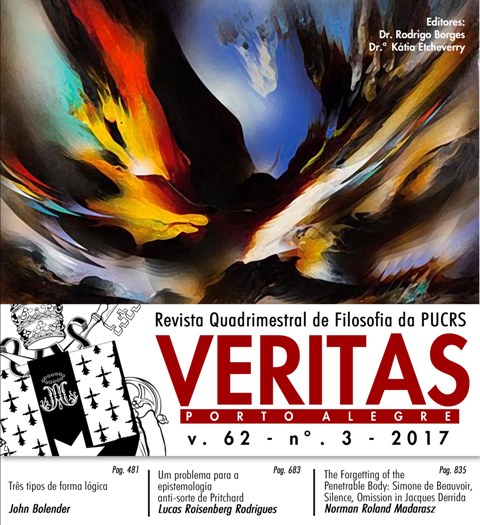Pluralism, citizenship and equality: Michael Walzer’s Theory of Justice
DOI:
https://doi.org/10.15448/1984-6746.2017.3.25798Keywords:
Political philosophy. Theory of Justice. Democracy. Michael Walzer.Abstract
The aim of this paper is to present a reconstruction of the Michael Walzer’s theory of justice from his work Spheres of Justice: A defense of Pluralism and Equality, which emphasizes only the pluralism, highlighting likewise the essential role of democratic citizenship in achievement of equality. To do this, it will be done a presentation of book’s basic concepts: the pluralistic theory of goods, the spheres of justice’s autonomy from the social significance of the goods, the negative notions of dominance and domination and the ideal of equality complex allegedly resulting from that autonomy. After, it will be analyzed a criticism pointing the failure of autonomous spheres for the realization of Walzer’s egalitarian project as a well the risk of inequality to which it is exposed, supporting the need for democratic citizenship to overcome it. Finally, it will show how Walzer itself has always adopted, although without developing it, the idea of democratic citizenship as the other indispensable bastion of equality.Downloads
References
ARAUJO, Marcelo de. David Hume e o “número de Dunbar”: uma abordagem evolucionista sobre os fundamentos da moralidade. In: Veritas, V. 61, n. 1, jan.-abr. 2016, pp. 89-106.
ARAUJO, Ricardo Corrêa de. A relação entre filosofia política e democracia na obra de Michael Walzer. In: Griot – Revista de Filosofia, Volume 14, Número 2, 2016. DOI: https://doi.org/10.31977/grirfi.v14i2.730
COHEN, Joshua. Spheres of Justice by Michael Walzer. In: The Journal of Philosophy, Volume 83, Issue 8, August 1986, pp. 457-468. DOI: https://doi.org/10.5840/jphil198683848
DEN HARTOGH, Govert. The Architectonic of Michael Walzer’s Theory of Justice. In: Political Theory, Vol. 27, No. 4, (Aug., 1999), pp. 491-522. DOI: https://doi.org/10.1177/0090591799027004004
DWORKIN, Ronald. To Each His Own. In: The New York Review of Books, Volume 30, Number 6, April 1983.
ELSTER, John. The Empirical Study of Justice. In: MILLER, David (Editor) & WALZER, Michael (Editor). Pluralism, Justice and Equality. Oxford: Oxford University Press, 1995. DOI: https://doi.org/10.1093/0198280084.003.0005
GALSTON, William A. Community, Democracy, Philosophy: The Political Thought of Michael Walzer. In: Political Theory, Vol. 17, No. 1 (Feb., 1989), pp. 119-130. DOI: https://doi.org/10.1177/0090591789017001009
HOWARD, Michael W. . Walzer’s Socialism. Social Theory and Practice, Vol. 12, No. 1 (Sping, 1986), pp. 103-113. DOI: https://doi.org/10.5840/soctheorpract198612117
KYMLICKA, Will. Filosofia política contemporânea: uma introdução. São Paulo: Martins Fontes, 2006.
MILLER, David. Complex Equality. In: MILLER, David (Editor) & WALZER, Michael (Editor). Pluralism, Justice and Equality. Oxford: Oxford University Press, 1995a. DOI: https://doi.org/10.1093/0198280084.001.0001
MILLER, David. Introduction. In: MILLER, David (Editor) & WALZER, Michael (Editor). Pluralism, Justice and Equality. Oxford: Oxford University Press, 1995b.
OLIVEIRA, Nythamar F. de. In: Síntese, v. 41, n. 131, 2014, pp. 393-413. DOI: https://doi.org/10.20911/21769389v41n131p393-413/2014
OREND, Brian. Walzer’s General Theory of Justice. In: Social Theory and Practice, Vol. 27, No. 2 (April 2001), pp. 207-229. DOI: https://doi.org/10.5840/soctheorpract200127210
RAWLS, John. Justiça como equidade: uma concepção política, não metafísica. In: Lua Nova, nº 25, 1992, p. 25-59. DOI: https://doi.org/10.1590/S0102-64451992000100003
____________. Uma teoria da justiça. São Paulo: Martins Fontes, 2000.
____________. O Liberalismo político. São Paulo: Martins Fontes, 2011.
SANDEL, Michael. O liberalism e os limites da justiça. Lisboa: Fundação Calouste Gulbenkian, 2005.
STASSEN, Glen. Michael Walzer’s Situated Justice. In: The Journal of Religious Ethics, Vol. 22, No. 2 (Fall, 1994), pp. 395-399.
TRAPPENBURG, Margot. In Defence of Pure Pluralism. Two readings of Walzer’s Spheres of Justice. In: The Journal of Political Philosophy, Volume 8, Number 3, 2000, pp. 343-362. DOI: https://doi.org/10.1111/1467-9760.00106
TUTUI, Viorel. Between the “Spheres of Justice” and the “Right to Citizenship”: The Limits of the Communitarian Theory of Michael Walzer. In: Meta: Research in Hermeneutics, Phenomenology and Practical Philosophy, Vol. 3, No. 1 (June 2011), pp. 130-140.
WALZER, Michael. Spheres of Justice: A Defense of Pluralism and Equality. New York: Basic Books, 1983a.
________________. “Spheres of Justice”: An Exchange. Michael Walzer, reply by Ronald Dworkin. In: The New York Review of Books, Volume 30, Number 12, July 21, 1983.
________________. A crítica comunitarista do liberalismo. In: Politica e paixão: rumo a um liberalismo mais igualitário. São Paulo: Martins Fontes, 2008.
_______________. Interpretation and Social Criticism. Cambridge: Harvard University Press, 1993.
_______________. Response. In: MILLER, David (Editor) & WALZER, Michael (Editor). Pluralism, Justice and Equality. Oxford: Oxford University Press, 1995.
_______________. Esferas da justiça: uma defesa do pluralismo e da igualdade. São Paulo: Martins Fontes, 2003.
______________. Thinking politically: essays in political theory. New Haven: Yale University Press, 2007.
_____________. Política e paixão: rumo a um liberalismo mais igualitário. São Paulo: Martins Fontes, 2008.
_____________. Achieving Global and Local Justice. In: Dissent, Volume 58, Number 3, Summer 2011, pp. 42-48. DOI: https://doi.org/10.1353/dss.2011.0058
WEBER, Thadeu. In: Filosofia Unisinos, Vol. 16, No. 1, jan/apr 2015, pp. 71-82. DOI: https://doi.org/10.4013/fsu.2015.161.05
WILLIAMS, Jeffrey J. . Criticism and Connection: An Interview with Michael Walzer. In: Symploke, Vol. 20, Nos. 1-2 (2012), p. 371-390. DOI: https://doi.org/10.5250/symploke.20.1-2.0371
VAN DER VEEN, Robert Jan. The Adjudicating Citizen: On Equal Membership in Walzer’s Theory of Justice. In: British Journal of Political Science, Vol. 29, No. 2 (Apr., 1999), pp. 225-258. DOI: https://doi.org/10.1017/S0007123499000113
Downloads
Published
How to Cite
Issue
Section
License
Copyright
The submission of originals to Revista Veritas implies the transfer by the authors of the right for publication. Authors retain copyright and grant the journal right of first publication. If the authors wish to include the same data into another publication, they must cite Revista Veritas as the site of original publication.
Creative Commons License
Except where otherwise specified, material published in this journal is licensed under a Creative Commons Attribution 4.0 International license, which allows unrestricted use, distribution and reproduction in any medium, provided the original publication is correctly cited. Copyright: © 2006-2020 EDIPUCRS</p






